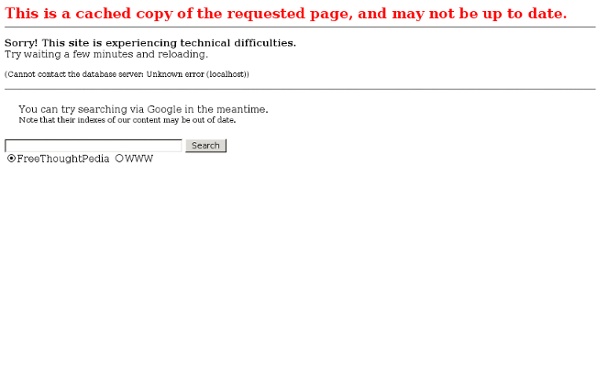



50 Atheist Quotes - Born Again Pagan 50 Atheist Quotes George Carlin 1. Religion easily has the best bullshit story of all time. Think about it. 2. 3. Frankie Boyle Why are we asked to pray after a disaster? Friedrich Nietzsche 4. 5. 6. Albert Einstein 7. 8. 9. Gandhi 10. 11. Mark Twain 12. 13. 14. 15. 16. Thomas Jefferson 17. 18. Benjamin Franklin 19. 20. Voltaire 21. 22. Stephen Hawking 23. 24. Jiddu Krishnamurti 25. 26. Christopher Hitchens 27. 28.If you gave Jerry Falwell an enema, he could be buried in a matchbox. Sigmund Freud 29. 29b. Karl Marx 30. MarxGeorge Bernard Shaw 31. Blaise Pascal 32. Richard Jeni 32. Steven Weinberg 34. Delos B. 35. Edward Gibbon 36. Robert Ingersoll 37. Huang Po 38. Benjamin Disraeli 39. Unknown 40. Dave Barry 41. Epicurus 42. Eric Hoffer 43. Bill Maher 44. 45. Baron D’Holbach 46. Bill Hicks 47. Isaac Asimov 48. José Bergamín 49. Arthur C. 50. Overtime quotes: Penn Gillette There is no god, and that’s the simple truth.
TIPIDIA Godchecker.com - Your Guide To The Gods. Mythology with a twist! World Mythology, Folklore, Cultures and Classical Studies Church of the SubGenius Jehovah 1, the primary deity of the Church of the SubGenius The Church of the SubGenius is an American parody and UFO religion that targets established faiths. It teaches a complex belief system that focuses on J. R. "Bob" Dobbs, purportedly a salesman from the 1950s, who is revered as a prophet by the Church. Ivan Stang, who co-founded the Church of the SubGenius in the 1970s, serves as its high profile leader and publicist. Origins[edit] The Church of the SubGenius was founded by Ivan Stang (born Douglas St Clair Smith) and Philo Drummond (born Steve Wilcox) as the SubGenius Foundation. Church leaders maintain that a man named J. Beliefs[edit] Deities[edit] The Church of the SubGenius' ostensible beliefs defy categorization or a simple narrative, often striking outside observers as bizarre and convoluted. Dobbs[edit] SubGenius leaders teach that Dobbs' nature is ineffable and consequently stylize his name with quotation marks. Conspiracy and "Slack"[edit] Members[edit] R. Instructions[edit]
Improv Encyclopedia Main Page - Metagovernment - Government of, by, and for all the people The Top 50 Proprietary Programs that Drive You Crazy — and Their Open Source Alternatives | WHDb The Top 50 Proprietary Programs that Drive You Crazy — and Their Open Source Alternatives Update January 22, 2013: This article was originally posted February 7, 2008. Since then, it has been one of our most popular articles here at WHdb.com. Not every proprietary program can drive a person crazy, right? The following fifty sixty proprietary programs are listed in no particular order within broad categories along with their open source alternatives. Jump to: Operating Systems & Web Browsers | Office Suites | Office Tools | Productivity | Graphic Programs | Web Editors | Desktop Publishing | Communications | Media | Utilities | Security | Financial | New for 2013 Operating Systems & Web Browsers Windows 10 to Ubuntu: This is Microsoft’s operating system (OS), and even Microsoft fans have become disillusioned with this product. Office Suites Microsoft Office to OpenOffice: If the price makes you feel that Microsoft has worked you over, then switch! Office Tools Productivity Graphic Programs
Born believers: How your brain creates God From New Scientist magazine 04 February 2009 by Michael Brooks Read our related editorial:The credit crunch could be a boon for irrational belief. WHILE many institutions collapsed during the Great Depression that began in 1929, one kind did rather well. During this leanest of times, the strictest, most authoritarian churches saw a surge in attendance. This anomaly was documented in the early 1970s, but only now is science beginning to tell us why. Religious ideas are common to all cultures: like language and music, they seem to be part of what it is to be human. The origin of religious belief is something of a mystery, but in recent years scientists have started to make suggestions. The religion-as-an-adaptation theory doesn't wash with everybody, however. An alternative being put forward by Atran and others is that religion emerges as a natural by-product of the way the human mind works. So how does the brain conjure up gods? This separation happens very early in life. Mind and matter